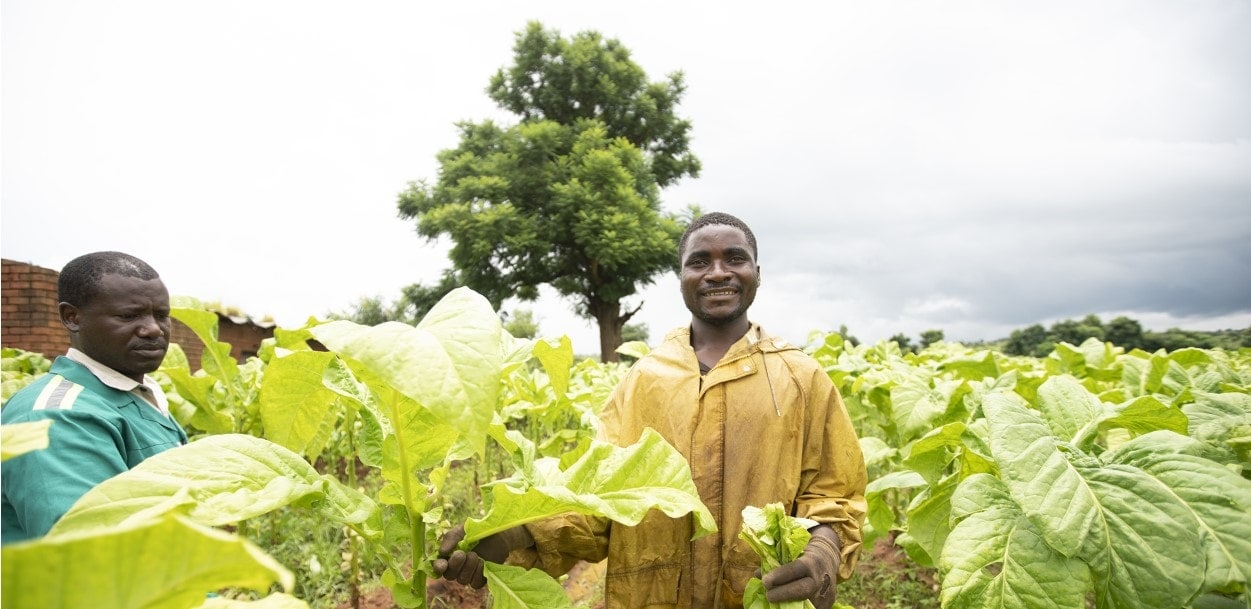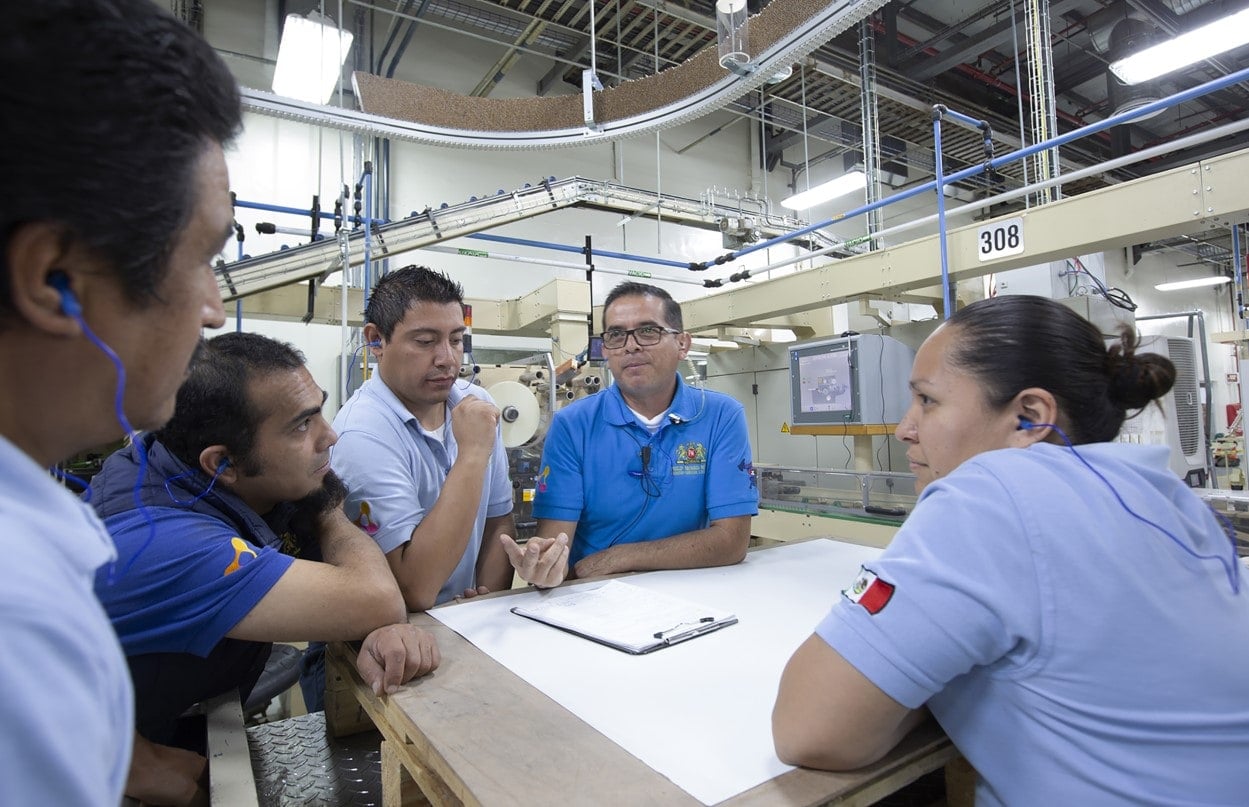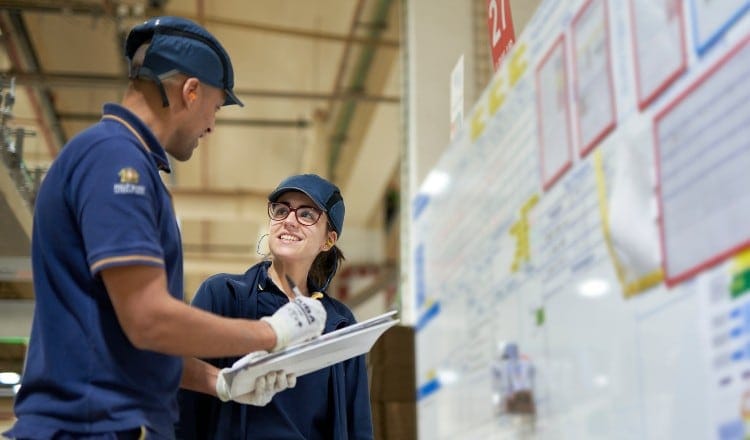| INTEGRATED REPORT 2019 |
All employees, irrespective of their role, location, type of employment, or length of service, have a right to fair working conditions. Our company’s global reach and footprint enable us to safeguard fairness in employment conditions and encourage many other companies within our value chain to do the same.
Why it is important to us and our stakeholders
Equitable conditions of employment are crucial for the peace and well-being of society and central to a sustainable and prosperous future for all. On matters of employment, poor representation of the views of employees could impair pay and living conditions.
For PMI, achieving our vision of a better future starts with our people. Our business model relies on employee engagement, satisfaction, loyalty, skills, and manufacturing quality. We view our current transformation as an opportunity to bolster productivity and promote the motivation and engagement of our employees. Management engaging regularly and at all levels with employees helps to promote the inclusive culture that’s critical to our success. In the absence of fair working conditions, productivity and efficient operations can be at risk, especially within the context of rapid change. Upstream, fair labor practices are also fundamental to securing supplies of tobacco leaf and other materials in a responsible and sustainable way.
Achieving our aims
Our ambition is to be an employer of choice wherever we operate in the world, ensuring that our employees are offered fair working conditions. We are committed to respecting all internationally recognized human rights in accordance with the UN Guiding Principles on Business and Human Rights. Treating people with respect and dignity is central to the fundamental principles that guide our business conduct and unite us at PMI.
We are determined to uphold high diligence in recognizing employee rights and fostering stable and collaborative labor relations practices. We are committed to respect the rights of employees to form or join trade unions and other employee representative organizations of their choice. We promote cooperation on matters of mutual concern and observe high standards of employment and labor relations.
In line with our Human Rights Commitment and the ILO standards on effective labor relations, our Workplace Integrity policy guides the work led by our People & Culture teams (our human resources function) globally.
PMI can only be a sustainable business if the significant changes in our working environment and labor practices are communicated and delivered clearly, fairly, and honestly, particularly during this time of transition. These changes affect everyone, including our own workforce, our suppliers, and our customers. We ensure our employees are informed of their rights by our local P&C teams, our Guidebook for Success, and related principles and practices, namely “workplace integrity” and collective labor agreements (CLA). Our SVP, People & Culture is accountable for fair working conditions, supported by the P&C teams.
Constructive engagement with employee representatives serves as a bedrock of effective labor relations. In addition to employees, stakeholders involved daily in such engagements include trade unions and works councils, both at the local level and, in Europe, at the regional level (European Works Council).
We also promote fair working conditions throughout our supply chain. Our Responsible Sourcing Principles set the requirements we expect suppliers to follow in relation to fair conditions for their employees. In our tobacco supply chain, our Agricultural Labor Practices code includes clear principles and measurable standards that recognize the right of farmworkers to fair treatment, clear terms of employment, and freedom of association.
Progress in 2019
Labor relations
Engagement is critical to managing change. In 2019, we continued to support employees in transition, ensuring that employee rights are respected regardless of age, aspiration, stage of career, or level of seniority. Where change affects an employee or group of employees, we work closely with their representatives, trade union, and/or workers’ council to manage any transition fairly and openly. In the case of job loss, we focus on employability: outplacement schemes, retraining, and skills-based workshops.
In 2019, the discontinuation of cigarette manufacturing in select factories in Pakistan, Colombia, Argentina, and Germany resulted in significant restructuring. The approach we took to minimize negative impacts illustrates the emphasis we place on our people and their continued employability.
In the case of Berlin, for example, our consultation with the local works council and trade unions, as well as close engagement with the European Works Council, helped to support the impacted employees in the transition period following the announcement that cigarette manufacturing would be halted there. Support actions included, for instance, engagement with outplacement agencies, the organization of a job fair with relevant potential employers, psychological support, and several options of financial support, all included in the agreed social plan.
In 2019, we continued our engagement with the International Union of Food, Agricultural, Hotel, Restaurant, Catering, Tobacco and Allied Workers’ Associations (IUF), a global union federation of national trade unions. For example, PMI took part in panel discussions – convened by the IUF and involving trade union officials from 22 countries – to discuss topics such as trade union rights and global initiatives. And our work with the European Works Council has expanded from labor relations to topics such as mental health, leadership, and employability.
Collective labor agreements govern many of our employees’ terms and conditions at work and may include several arrangements, such as working hours, occupational health and safety, holidays, wages, and procedures for dispute resolution. In 2019, we had 80 CLAs in 35 countries, covering approximately 63 percent of employees.
We operate in multiple countries, with widely varying legal employment standards. In some of these countries, freedom of association is not part of national legislation. As a global company, we consider it our duty to ensure that our entire workforce, regardless of local or national standards, is treated fairly and with respect, and in line with our standards. We strive to work with employees’ consultative committees and other suitable mechanisms of representation.

Living wage
A living wage, which is distinct from a minimum wage, provides an employee with the means to enjoy a decent standard of living. This includes the ability to buy goods and services and build up savings. A living wage takes into account local living standards. PMI intends to provide at minimum a living wage for all employees; in 2019, we continued to work with Business for Social Responsibility to assess pay rates globally and confirm that we pay a living wage everywhere. Following the expansion of our wage survey in 2018, and, in order to cover standards for temporary and seasonal employees, further checks were carried out during 2019 to ensure we maintain our global commitment. We undertake this type of survey every two years, the next being planned for 2020.
In 2019, we analyzed life insurance benefits globally to assess what programs are provided across our affiliates. We are currently reviewing results to potentially implement a roadmap in 2020-2021 if and where any remedial action is needed. We are looking at the overall employee benefits offered to our employees to understand whether minimum standards should be implemented, considering and balancing the variety of contexts, regulations, agreements, and employee preferences.
In our agricultural supply chain, we have also initiated work on a living income. Our objective is to improve the capacity of tobacco farming communities to achieve a decent standard of living, which is a key enabler to eliminating child labor and to providing safe and fair working conditions on tobacco farms.
Next steps
PMI will continue to develop engagement programs, particularly in markets where labor relations are currently less strong. Employee representation is being strengthened in countries where there are particular challenges relating to collective agreements. Further, our next living wage survey will be delivered in 2020.
This online supplement to our integrated report should be read in conjunction with PMI’s Integrated Report 2019. The information and data presented in this online supplement cover the 2019 calendar year or reflect status at December 31, 2019, worldwide, unless otherwise indicated. Where not specified, data come from PMI estimates. See About this online supplement for more information. Aspirational targets and goals do not constitute financial projections, and achievement of future results is subject to risks, uncertainties and inaccurate assumptions, as outlined in our forward-looking and cautionary statements.






